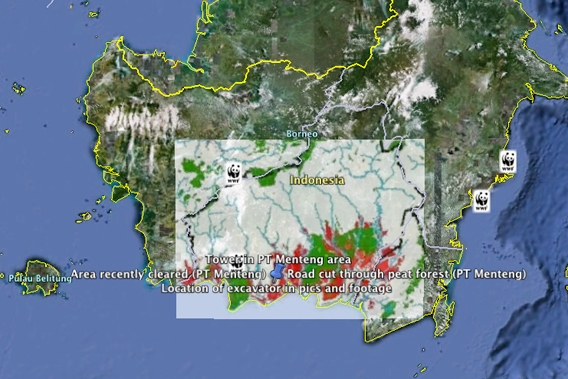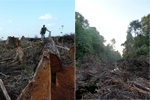
PT Menteng’s alleged breach of Indonesia’s forest moratorium. The red areas are off-limits to new concessions.
A fire is burning within a concession controlled by PT Menteng Jaya Sawit Perdana in Indonesian Borneo turning up the heat on its parent company, the Malaysia-based conglomerate Kuala Lumpur Kepong Berhad (KLK), which supplies “sustainably-produced” palm oil to companies like Cargill and is already under investigation for breaching Indonesia’s new moratorium on forest conversion, according to the Environmental Investigation Agency (EIA).
EIA says that satellite data from NASA’s Moderate Resolution Imaging Spectroradiometer (MODIS) has registered “a high percentage certainty of a fire” within PT Menteng’s concession area on June 22-23.
The revelation comes just days after KLK’s plantations director Roy Lim was quoted as stating: “KLK has long abandoned using fire to clear land for new planting or replanting. Our policy and practice is zero burning for such activities.”
EIA is now calling for KLK to prove its claim.
“KLK should prove it is not carrying out land burning in its plantation or its denials will amount to no more than hot air,” said EIA Senior Forest Campaigner Jago Wadley. “This evidence puts KLK very much in the hot spot.”
Open burning is prohibited under both Indonesian law and sustainability standards set by the Roundtable on Sustainable Palm Oil (RSPO). Worse, the fires are burning within an area prohibited from conversion under Indonesia’s forest moratorium. The area of peat forest was illegally cleared by PT Menteng, according to an undercover investigation last month by EIA and Telapak.
EIA and Telapak say their analysis of MODIS data revealed fires in other areas ostensibly covered by Indonesia’s moratorium.
“With burning season entering full swing in Indonesia, [we] are concerned that Indonesia’s commitment to REDD+ remains in danger of failing without significant law enforcement reforms,” said the groups in a joint statement.
Related articles
Indonesia to investigate palm oil company that allegedly breached moratorium

(06/21/2011) Indonesia’s REDD+ Task Force will investigate charges that PT Menteng Jaya Sawit Perdana (PT Menteng), a palm oil company owned by Malaysia-based Kuala Lumpur Kepong Berhad (KLK), has cleared peat forest in breach of the country’s newly-signed moratorium on the granting of new forestry licenses on peatlands and in primary forest areas. The allegation was levied by the Environmental Investigation Agency, an international NGO, and Telapak, an Indonesian group, after an on-the-ground undercover investigation. EIA and Telapak found that PT Menteng had cleared peat forest near Sampit in Indonesia’s Central Kalimantan province without securing proper licenses.
Malaysian palm oil company violates Indonesia’s logging moratorium
(06/16/2011) An undercover investigation has found evidence that a subsidiary of Malaysian palm oil company has illegally cleared forest in breach of the Indonesia’s moratorium on new permits in primary forest areas and peatlands.
Indonesia’s anti-mafia unit seeks to reopen $115 billion illegal logging case
(06/08/2011) Indonesia’s Anti-Mafia Law Task Force asked authorities Tuesday to reopen an investigation into illegal logging that may have cost the Indonesian state $115 billion.
Indonesia’s moratorium disappoints environmentalists

(05/20/2011) The moratorium on permits for new concessions in primary rainforests and peatlands will have a limited impact in reducing deforestation in Indonesia, say environmentalists who have reviewed the instruction released today by Indonesian President Susilo Bambang Yudhoyono. The moratorium, which took effect January 1, 2011, but had yet to be defined until today’s presidential decree, aims to slow Indonesia’s deforestation rate, which is among the highest in the world. Indonesia agreed to establish the moratorium as part of its reducing emissions from deforestation and degradation (REDD) agreement with Norway. Under the pact, Norway will provide up to a billion dollars in funds contingent on Indonesia’s success in curtailing destruction of carbon-dense forests and peatlands.







